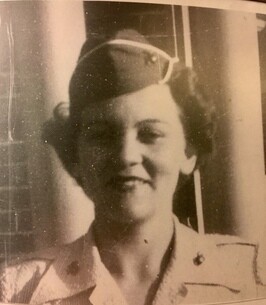

Velora Darling
July 15, 1922 — December 4, 2018
Velora Darling
Velora “Val” Darling
Val Darling was born on a small farm in Iowa on July 15, 1922. Sha had four older sisters, an older brother, and a sister ten years younger than she.
They moved to Paullina, Iowa, where her father, Mr. Howe, was the town marshal. Paullina was a town of about 1,200 people. In the late forties, it still had only one gas station, one grocery store, one hardware store, and one bank. The most popular building was the one housing both the bowling alley and the pool hall.
Val’s family lived on the outskirts of town. They had cows, a dog named Spot, and a big garden. The kids hated pulling weeds in the garden, and they hated even more picking the potato bugs off the plants; they were so ugly! Mother grew and sold strawberries and sweet potatoes. People would come out to their place and buy them. This really helped, during the Depression.
Food was very simple fare-just everyday food. Most of it they grew themselves. There were few desserts
Val said she was afraid of the dog, but she doesn’t remember why. Her dad used to dress him with a cap, sunglasses and a pipe in his mouth. People would pay to take his picture.
One day, one of Val’s sisters and she decided to practice the saxophone and the clarinet to see if they could get good enough to play in the school band. They were on the porch, playing their best, when the cows came running home from way out in the pasture. They were teased about this until they put the instruments away, never to play again.
Val’s mother saved cans, boxes, bottles and containers she could find. Then she set up a store in the shed for the children to play in. This way they learned how to add and how to make change.
Playing school was fun, and it improved their classroom studies. They would take turns being the teacher. Val loved it when she was asked to read something.
During the Depression, they had no store-bought toys. They learned to make their own. The catalogs gave the girls hours of fun play time. They would make paper dolls and dress them, all from the models in the catalog. They could make up stories, using them as their families and friends.
Any money made by someone in the family went into the family pot. Val’s brother raised night crawlers. When he got tired of that, he let the girls take over his business. In order to collect the night crawler, one had to go out at night when it was raining, because it was then that they’d pop out of the ground. The collecting stopped after a while, but the girls made some money from the sales of those they already had.
Val remembers life during the Depression being hard, but since everyone was in the same fix, no one thought of themselves as poor. Val said each of them had two sets of clothes, one being worn and the other either in the laundry or waiting to be put on the next day. Val’s father had a wooden pole in the ground with a metal shoe form on top. He taught himself to resole and re-heel shoes, because they couldn’t afford to go to the shoe repair man. Until they were resoled, cardboard was placed inside, over the hole.
The children and their parents didn’t get gifts at Christmas. Val remembers that one Christmas, when her little sister had a bone disease, that her big brother made some small furniture pieces and Val and he painted them. Her little sister had some toys to play with that year.
After Val graduated from high school, she went Sioux City, Iowa, where she worked in S.S. Kresge’s Five and Dime Store. Then she learned of a job in a defense plant in Omaha, Nebraska, so she moved there. She was working there in 1944, when she joined the Marine Corps. The Marine’s sent her to the El Toro Marine Corps Air Station in Santa Ana, California. She was there until discharge.
It was at a country dance at the South Liberty Hall that she met her future husband Del. After their marriage, they bought a fifth wheeler and traveled across the United States and Canada. They also sold costume jewelry at a street fair in Palm Desert. They sold from seven in the morning until three in the afternoon. If they didn’t make $1,000 every day, during that time, they didn’t have a good day or a good week.
Val and her husband knew a woman who already had a large family. She was pregnant and didn’t think she could care for one more child. She allowed Val and her husband to adopt her baby and to it home, right from the hospital. They baby was a girl, whom they named Debi. Their daughter grew up, married and gave them three grandsons.
Television has little appeal to Val, but she does like to read. She also likes to eat lobster and rhubarb pie, when she can get it. Walking keeps her fit.
She has a very positive outlook on life, goes on as many outings as possible, has a great sense of humor, counts her blessings and tries to encourage others. She also has some very strong opinions.
Val leaves us with these words, “Don’t waste any time. Enjoy today.” She follows her own advice.
Val Darling was born on a small farm in Iowa on July 15, 1922. Sha had four older sisters, an older brother, and a sister ten years younger than she.
They moved to Paullina, Iowa, where her father, Mr. Howe, was the town marshal. Paullina was a town of about 1,200 people. In the late forties, it still had only one gas station, one grocery store, one hardware store, and one bank. The most popular building was the one housing both the bowling alley and the pool hall.
Val’s family lived on the outskirts of town. They had cows, a dog named Spot, and a big garden. The kids hated pulling weeds in the garden, and they hated even more picking the potato bugs off the plants; they were so ugly! Mother grew and sold strawberries and sweet potatoes. People would come out to their place and buy them. This really helped, during the Depression.
Food was very simple fare-just everyday food. Most of it they grew themselves. There were few desserts
Val said she was afraid of the dog, but she doesn’t remember why. Her dad used to dress him with a cap, sunglasses and a pipe in his mouth. People would pay to take his picture.
One day, one of Val’s sisters and she decided to practice the saxophone and the clarinet to see if they could get good enough to play in the school band. They were on the porch, playing their best, when the cows came running home from way out in the pasture. They were teased about this until they put the instruments away, never to play again.
Val’s mother saved cans, boxes, bottles and containers she could find. Then she set up a store in the shed for the children to play in. This way they learned how to add and how to make change.
Playing school was fun, and it improved their classroom studies. They would take turns being the teacher. Val loved it when she was asked to read something.
During the Depression, they had no store-bought toys. They learned to make their own. The catalogs gave the girls hours of fun play time. They would make paper dolls and dress them, all from the models in the catalog. They could make up stories, using them as their families and friends.
Any money made by someone in the family went into the family pot. Val’s brother raised night crawlers. When he got tired of that, he let the girls take over his business. In order to collect the night crawler, one had to go out at night when it was raining, because it was then that they’d pop out of the ground. The collecting stopped after a while, but the girls made some money from the sales of those they already had.
Val remembers life during the Depression being hard, but since everyone was in the same fix, no one thought of themselves as poor. Val said each of them had two sets of clothes, one being worn and the other either in the laundry or waiting to be put on the next day. Val’s father had a wooden pole in the ground with a metal shoe form on top. He taught himself to resole and re-heel shoes, because they couldn’t afford to go to the shoe repair man. Until they were resoled, cardboard was placed inside, over the hole.
The children and their parents didn’t get gifts at Christmas. Val remembers that one Christmas, when her little sister had a bone disease, that her big brother made some small furniture pieces and Val and he painted them. Her little sister had some toys to play with that year.
After Val graduated from high school, she went Sioux City, Iowa, where she worked in S.S. Kresge’s Five and Dime Store. Then she learned of a job in a defense plant in Omaha, Nebraska, so she moved there. She was working there in 1944, when she joined the Marine Corps. The Marine’s sent her to the El Toro Marine Corps Air Station in Santa Ana, California. She was there until discharge.
It was at a country dance at the South Liberty Hall that she met her future husband Del. After their marriage, they bought a fifth wheeler and traveled across the United States and Canada. They also sold costume jewelry at a street fair in Palm Desert. They sold from seven in the morning until three in the afternoon. If they didn’t make $1,000 every day, during that time, they didn’t have a good day or a good week.
Val and her husband knew a woman who already had a large family. She was pregnant and didn’t think she could care for one more child. She allowed Val and her husband to adopt her baby and to it home, right from the hospital. They baby was a girl, whom they named Debi. Their daughter grew up, married and gave them three grandsons.
Television has little appeal to Val, but she does like to read. She also likes to eat lobster and rhubarb pie, when she can get it. Walking keeps her fit.
She has a very positive outlook on life, goes on as many outings as possible, has a great sense of humor, counts her blessings and tries to encourage others. She also has some very strong opinions.
Val leaves us with these words, “Don’t waste any time. Enjoy today.” She follows her own advice.
To order memorial trees or send flowers to the family in memory of Velora Darling, please visit our flower store.
Photo Gallery
Guestbook
Visits: 0
This site is protected by reCAPTCHA and the
Google Privacy Policy and Terms of Service apply.
Service map data © OpenStreetMap contributors





